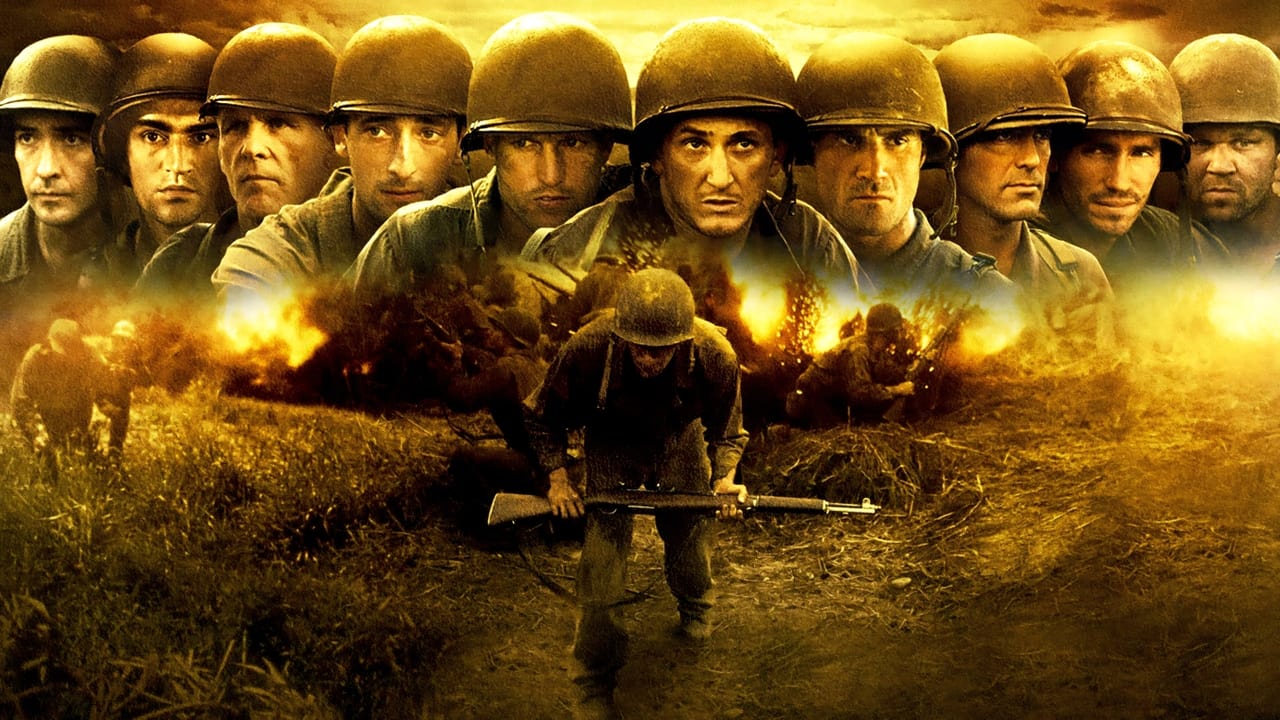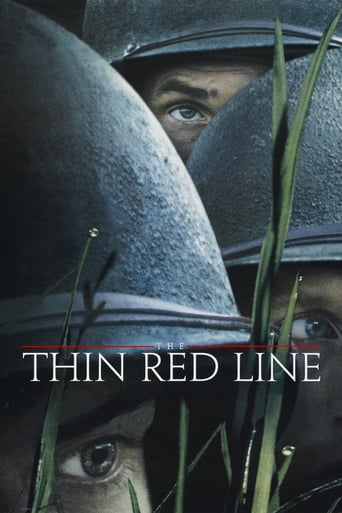

Charming and brutal
... View MoreBoring, over-political, tech fuzed mess
... View MoreI have absolutely never seen anything like this movie before. You have to see this movie.
... View MoreVery good movie overall, highly recommended. Most of the negative reviews don't have any merit and are all pollitically based. Give this movie a chance at least, and it might give you a different perspective.
... View MorePlease help i want to stop re-watching this great movie . what can i say ? i can't say anything just if you haven't seen this movie just stop reading and close the window of this page and watch it. i think and believe there is not war movie comparing with this great movie . Thank you Malick
... View MoreSome American soldiers walking, crawling through the grass somewhere in the Pacific, in World Ward II. Te steady camera stays low so you can reach out your hand to touch the soldiers. The wind sweeps through or blows in from the sea as if it was aware of what's at stake. All in these fighting scenes seems perfectly organized and undoubtedly suits Terrence Malik's purpose with this film: a deep and stark reflection on the human condition in the context of a ruthless war.Unlki so many other war films, The Thin Red Line allows the narrative to take over. Blood, cruelty and fate are still there as they are a part of any war, but this films takes it all onto a different path to approach the unavoidable question: What's left of a human being if you take away what gives life sense? And the response, as tough as it is, is simple: nothing . This is very well conveyed by showing us characters who have to put up with the "dehumanazation machine" that war is and do so by contracting themselves, by betraying or even denying the inner desires and convictions. Is redemption possible for them? Another tool Malicks uses wisely is language. Along with soldiers'slang, there are some poetic lines here and there that make up the thoughts the soldiers'thoughts, which we get to hear. The actors do a pretty good job depicting human beings on the brink of collapse, facing the mos challenging moment in their lives. Yet the experience of killing another human being is a life-changing experience for everybody, I never had the feeling that the film was made to let this or that character outshine the rest and drive the plot forward single handedly. On the contrary, what's great is the sense of wonder, of watching a film that has to be understood as a whole. Aney attempt of breaking it down into smaller pieces, would be nothing but a waste of time. Wouldn't it be better if we'd just go along with what we are offer? Thus, perhaps, we could ask ourselves some questions.
... View MoreTHE THIN RED LINE-reflects Jamse Jones novel of the same title; that clearly states it is a fictional account of soldiering in war. Stop picking it apart for "realism."Read the book and WWII: A CHRONICLE OF SOLDIERING. Educate yourself about the authored reality/fictionalized for the sake of honoring the dead.You may have a more accurate understanding regarding the the films directional texture.Hopefully you will gain a much better understanding of what this film has accomplishes in depth and artistic reflection. Come away with greater respect.This is not an all grit adrenaline junkie blood and guts war movie. And stop pontificating semantics related to your own self defecating projections. Following orders: Really a moot point to criticize when, for example, General Clark choked at the invasion at Anzio,Italy creating a unwarranted massacre of GI Infantry. He refused Eisenhower's orders. War is a complex paradoxical grand design of the rank and file learning to live and handle fear knowing the inevitable death of soldiers en mass.Leave this film as is -appreciate it and allow it to engulf your naive psyche for its poetically enthralling lush green landscape and introspective narrative for each one has to have a pure essence in beholding the actuality of a slice of what the Pacific war is about.It is not an anti-war film (e.g.Coming Home). Correct-Japs committed Bushito-suicide charges instead if surrender. This was incorrectly depicted but the capture scene provided a look at the disseminated enemies futility not to surrender-but to die slow deaths in a heap of scorched flesh bullet riddled and bleeding soon to be corpses finality. Notable were that Marines extracted gold fillings from their enemy teeth;though the Japs committed a thousand times worst atrocities on POWs and civilians.Adrian Brody did an excellent acting performance for not having any lines. He speaks with his eyes-pure terror with a thousand yard stare.And John C Riley deserves to be noted as a credible member if the cast.Having lived in the tropical jungles I comprehend what (know first hand) Jones harmoniously expression honoring natures spell expressed in poetic verse as homage to nature's bliss and human cruelty of destruction when war becomes a predator on the Innocent Indigenous who revered the cathedral grandeur of the tropics as their life source.This is why it is one of my favorite films.
... View MoreIn "The Thin Red Line" director Terrence Mallick has chosen a well-known war novel by James Jones and given us a brilliant vision that combines the interaction of war and nature along with the thoughts and actions of men in a crystalline organic drama. Much in the way Frank Lloyd Wright created his "organic architecture", a confluence of the site, native building materials and utilitarian form and structure that defined the style, Mallick has graced his audience with an amoebic creation containing the unlikely and intolerant co-mingled elements of nature, war and man.Much of the criticism of the film's content and style seems to stem from the opinion that war movies must be realistic, faithful to historic review and in this case, loyal to the writings of the author of "The Thin Red Line", James Jones. Mallick is an artist of film making and if this is the form we seek to understand, it would appear that he has triumphed beyond the highest zenith of this time honored genre.By contrasting the natural cinematic beauty of the landscape and people of Guadalcanal against the hellish realism of war, Mallick has successfully fused the emotions of, about and between men caught in this impossible situation with the use of narrative voice-overs, a technique he previously mastered in his two other films, "Badlands" and "Days of Heaven". With the main character's thoughts being shared and shaped gradually throughout the film, the actors and the audience experience the growth of emotions simultaneously. This can be viewed by skeptics as manipulative or it can be viewed as powerfully soulful and heartfelt, while building magnificent character studies that transcend war itself. This is the risk and daring that sets Mallick apart from his more popular counterpart, Steven Spielberg and his sentimental saga, "Saving Private Ryan".The viewer must either jump aboard for this thrilling, gut-wrenching ride of insightful fulfillment or emotionally abandon ship in favor of the memory of logically safe and realistic dramas that are recognized as the hallmarks of our treasured war film library. I would suggest that many viewers seem to take the easy way out and reject Mallick's art as frivolous and ill-conceived. I would, however, recommend that you whole-heartily sign on without turning back to experience Mallick's tour of brilliance. It's the only way to discover the true greatness of this film or to even possibly consider it as one of the finest war films ever made.
... View More